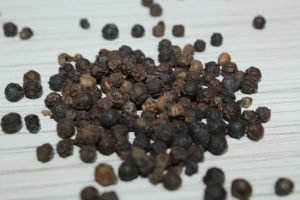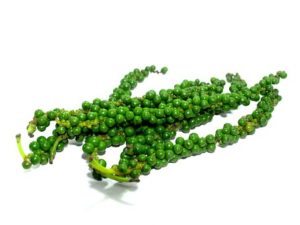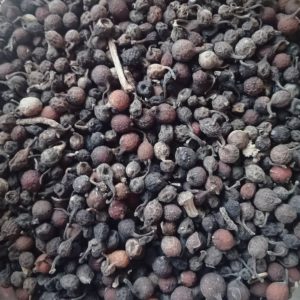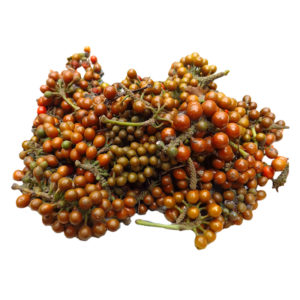
Black pepper or black peppercorns is a well-researched dried fruit of the flowering piper vine. It is well known for the piperine it contains which is responsible for that pungent taste it has. Piperine has been strongly associated with reduced inflammation and oxidative stress and its many benefits in the fight against diseases such as cancers have been studied. Piperine when combined with curcumin (bioactive compound in turmeric), makes curcumin more bioavailable. Together, they form a powerful combo of antioxidants.

Black pepper (piper nigrum) is native to Kerala in South West India though it grows well in the tropics. However, Vietnam happens to be the largest producer and exporter.
In Africa, we have a specie called the Piper guineense. it is also known as West African Black pepper, Benin pepper, Uziza seeds, Ashanti pepper, false cubeb, and Masoro. Unlike Piper nigrum, Piper guineense is native to central and west Africa.

You would find Uziza seeds readily in the markets in Nigeria particularly in the South.

Photo credit: ssaf.group
How Similar are they?
Uziza seeds and the regular black pepper look very similar; sharing a dark, black colour. They both can grow well in the tropics and contain essential oils, minerals that have positive effects of health. In terms of what they can do, both seeds contain antioxidants and have anti-inflammatory and anti-microbial properties.. They have both been used as insecticides.
What is the difference between the regular black pepper and Uziza seeds?
Some characteristics set them apart.
The aroma of Uziza seeds is milder than the black pepper. This is expected as piperine content of Uziza seeds is lower than that of black pepper. Piperine is responsible for that spicy flavor that the black pepper has.
Uziza seeds on the other hand contains higher levels of volatile oils particularly the linalool, which is responsible for the pleasant floral aroma. This Aroma is absent in the regular black pepper. Instead, the black pepper has a spicy and woody aroma.
To put this in a general summary, the aroma of the seeds sets them apart.Also, the chemical composition of the regular black pepper and Uziza are different, while containing similar components, they vary in terms of the amount of each of the components (which invariably sets them apart in taste and possibly in their activity in the body).
In a Nutshell:
These spices are both beneficial to the health. Adding either the black pepper or the Uziza seeds to your meals daily adds not just some spark to your meals in terms of flavor but also provides some small amounts of antioxidants and elements that have ability to protect your body. Uziza can be used as a substitute for the black pepper.
It is important to note that piperine is easily lost when subjected to heat and pressure cooking causing the greatest loss.
Some notes:
Juliani, H. R., Koroch, A. R., Giordano, L., Amekuse, L., Koffa, S., Asante-Dartey, J., & Simon, J. E. (2013). Piper guineense(Piperaceae): Chemistry, Traditional Uses, and Functional Properties of West African Black Pepper. African Natural Plant Products Volume II: Discoveries and Challenges in Chemistry, Health, and Nutrition, 33–48. doi:10.1021/bk-2013-1127.ch003
Jirovetz, L., Buchbauer, G., Ngassoum, M. B., & Geissler, M. (2002). Aroma compound analysis of Piper nigrum and Piper guineense essential oils from Cameroon using solid-phase microextraction–gas chromatography, solid-phase microextraction–gas chromatography–mass spectrometry and olfactometry. Journal of Chromatography A, 976(1-2), 265–275. doi:10.1016/s0021-9673(02)00376-x



INTERESTING.
Educative